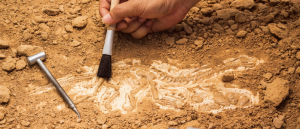Did eating meat really make us human?

The long-held hypothesis that eating meat corresponds with Homo erectus’ development of ‘human’ traits, such as large brains, nearly 2 million years ago is being unraveled.
Homo erectus – meaning upright man – is often considered the earliest ancestor of modern humans with many human-like qualities. Archeological evidence has shown that meat eating increases vastly after the emergence of Homo erectus, providing a basis for the claim that the evolutionary development of these human-like traits could be linked to this major dietary change. However, a recent study has shown this may not be the case at all and suggests that the interest of paleoanthropologists in this period has led to a much greater volume of research, which can account for the dramatic ‘boom’ in meat eating.
“Generations of paleoanthropologists have gone to famously well-preserved sites in places like Olduvai Gorge looking for – and finding – breathtaking direct evidence of early humans eating meat, furthering this viewpoint that there was an explosion of meat eating after 2 million years ago,” explained lead author W. Andrew Barr (George Washington University, DC, USA). “However, when you quantitatively synthesize the data from numerous sites across eastern Africa to test this hypothesis, as we did here, that ‘meat made us human’ evolutionary narrative starts to unravel.”
 Ancient DNA extracted from dirt in microscopic fossil-like bone particles
Ancient DNA extracted from dirt in microscopic fossil-like bone particles
Researchers have been able to extract ancient DNA from archaeological sediments using polyester resin, successfully obtaining DNA from samples collected 40 years ago.
The team analyzed published data from 59 archeological sites in East Africa dated between 2.6 and 1.2 million years ago, focusing on: the number of sites with animal bones that had cut marks made by stone tools, the total number of animal bones with cut marks in each site and the number of separately reported stratigraphic levels.
They discovered that there was no increase in the relative volume of meat eating after the emergence of Homo erectus. The number of animal bones and sites from the time period after the appearance of Homo erectus was increased, hence sampling volume here was increased too, which looks likely to have skewed evidence in favor of the ‘meat made us human’ hypothesis.
“I’ve excavated and studied cut marked fossils for over 20 years, and our findings were still a big surprise to me,” co-author Briana Pobiner (Smithsonian’s National Museum of Natural History; DC, USA), commented. “This study changes our understanding of what the zooarchaeological record tells us about the earliest prehistoric meat-eating. It also shows how important it is that we continue to ask big questions about our evolution, while we also continue to uncover and analyze new evidence about our past.”
It now looks like it’s back to the anthropological drawing board for alternative suggestions on why early humans evolved certain traits, which are supported by archeological evidence. Barr also believes anyone basing their diet around the ‘meat made us human’ narrative should find the results of interest. “Our study undermines the idea that eating large quantities of meat drove evolutionary changes in our early ancestors,” he concluded.